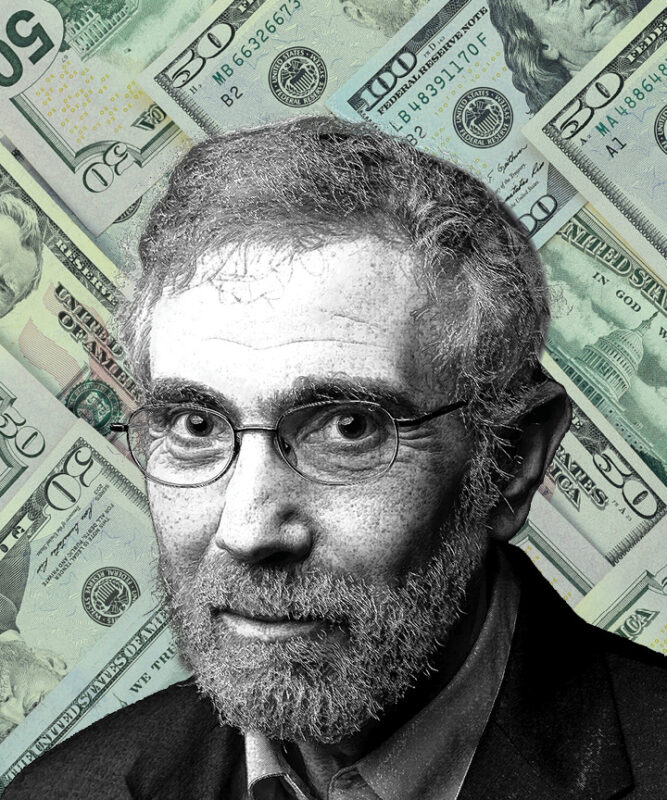
Interview by Lynn Adams Smith
Nobel Prize-winning economist Paul Krugman is the Distinguished Professor of Economics at the Graduate Center of the City University of New York and professor emeritus of Princeton University. He received his BA in economics from Yale University, where he was a National Merit Scholar, and earned a PhD in economics from MIT. Krugman is the author or editor of 27 books, including scholarly works, textbooks, and books for the general public. His most recent book, Arguing with Zombies: Economics, Politics, and the Fight for a Better Future, expands upon his New York Times opinion columns to highlight how some conservative lawmakers use false or misleading information to benefit the wealthiest Americans.
In your book, you describe zombies as “ideas” that have been proven wrong by evidence but refuse to die. The ideas keep shambling along, eating away at people’s brains, and are kept alive by influential people such as billionaires and politicians. What are a few examples of zombies?
The most persistent zombie in U.S. discourse — the Zombie Supreme, you might say — is the belief that cutting taxes on high-income individuals will create an economic miracle. It never works, yet the belief persists. Belief that government debt is terrible, horrible, that it means crisis any day now is another, and it persists even though the debt scaremongers have been wrong year after year. Yet another is the belief that we can’t address environmental problems without killing the economy, even though clean technologies have made huge progress.
How is a cockroach idea different from a zombie, and what is an example?
Cockroach ideas are ideas that can be made to go away for a while, but keep coming back. I think I introduced the term in response to people who kept saying that Keynes would never have advocated fiscal stimulus if debt had been this high in his day. When you point out that debt was actually very high in the 1930s, this claim tends to go away, but someone else who hasn’t checked the facts always shows up to make it again.
Who will benefit the most from Biden’s coronavirus relief package, and does it properly target the specific needs of the current crisis? Is $1.9 trillion the appropriate size to jump-start employment recovery? How does the relief package compare to Obama’s 2009 $831 billion stimulus plan?
This is a very redistributive plan: huge benefits for lower-income families, especially with children. It’s important to understand that it’s NOT mainly about jump-starting the economy; it’s about getting us through the rest of the pandemic. And I have to admit, it’s a generous plan — it provides mostly adequate aid to those in need, and does scatter the aid widely, so many people who might not need help get money as well — which is OK. This is all a huge contrast with Obama’s stimulus, which was supposed to drive recovery, and was woefully underpowered for the task.
The $15 minimum wage proposal did not make it into the relief package. What do history and data say about the correlation between increasing wages and job loss? Is it possible that increasing the current minimum from $7.25 to $15 is too big of a jump for small businesses trying to stay afloat during COVID?
Minimum wages are a subject where we have unusually good evidence, because many states set minimums above the federal level and we can see what happens when they raise wages. The answer, overwhelmingly, is low to zero job loss. To some extent that might be because minimum wages are so low — surely a minimum wage of, say, $30 would cost jobs. But we can be reasonably sure that not many jobs would be lost if we went up to $15. more
 When 5-year-old Albert Einstein was sick in bed, his father gave him a compass. According to Curt Wilkinson in Words That Changed the World: Albert Einstein’s Theory of Relativity (Laurence King 2020), the boy was “entranced by the invisible forces that attracted the needle, keeping it pointed to the magnetic north.” Six years later, Einstein was given a volume that he called his “sacred little geometry book.” In time the compass and the book became “two wonders” that roused his curiosity about the way the universe worked. more
When 5-year-old Albert Einstein was sick in bed, his father gave him a compass. According to Curt Wilkinson in Words That Changed the World: Albert Einstein’s Theory of Relativity (Laurence King 2020), the boy was “entranced by the invisible forces that attracted the needle, keeping it pointed to the magnetic north.” Six years later, Einstein was given a volume that he called his “sacred little geometry book.” In time the compass and the book became “two wonders” that roused his curiosity about the way the universe worked. more



















